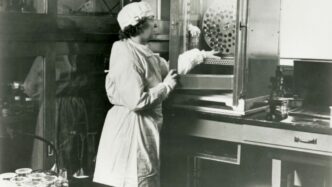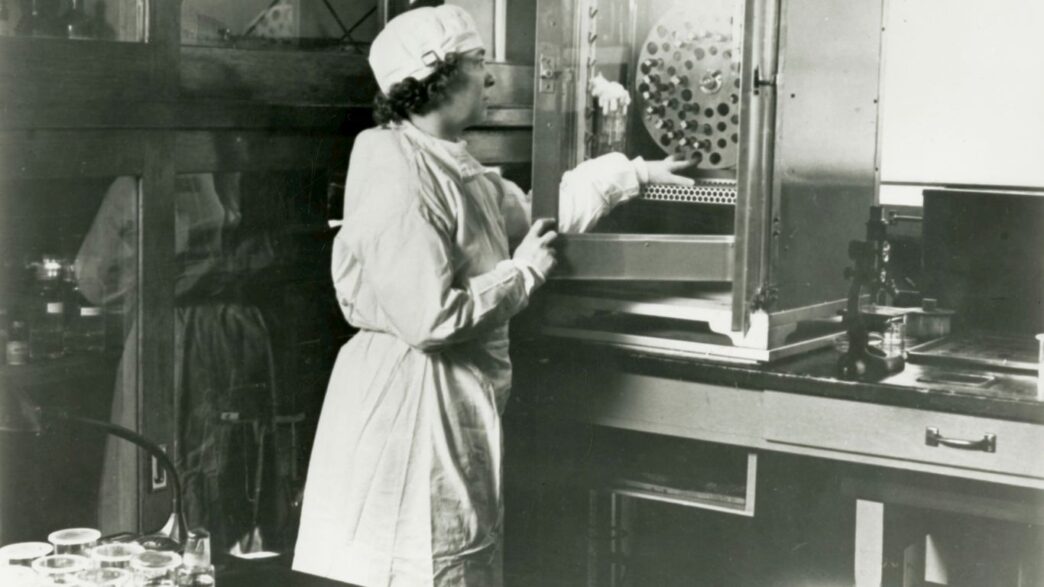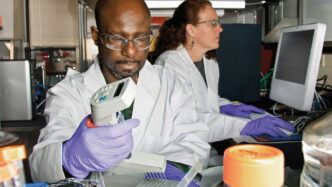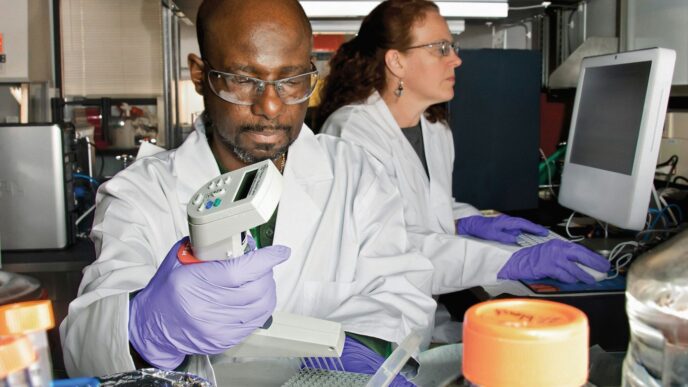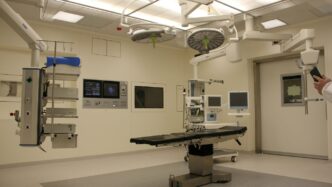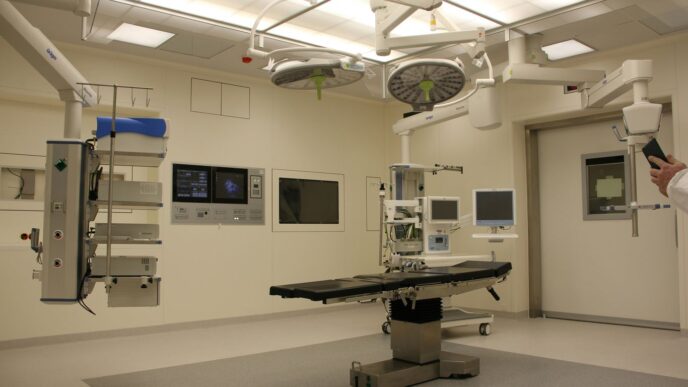Quest Diagnostics is really changing the game when it comes to cancer care. They’ve got all these advanced tests, especially in molecular oncology, that are helping doctors figure out the best way to treat people. It’s not just about finding cancer anymore; it’s about understanding it on a really deep level to make treatment more personal and effective. They seem to have a lot of bases covered, from solid tumors to blood cancers and even figuring out genetic risks.
Key Takeaways
- Quest Diagnostics provides detailed solutions for solid tumors, helping tailor treatments to individual patients.
- They offer extensive testing for blood cancers, including molecular assays and cytogenetics.
- Understanding hereditary cancer risks is made easier with their wide range of genetic tests and support.
- Their approach integrates science and technology for precise oncology, backed by strong operational and regulatory knowledge.
- Quest Diagnostics supports the entire cancer journey, from initial screening through survivorship, with advanced pathology and molecular testing.
Quest Diagnostics Molecular Oncology: Advancing Cancer Care
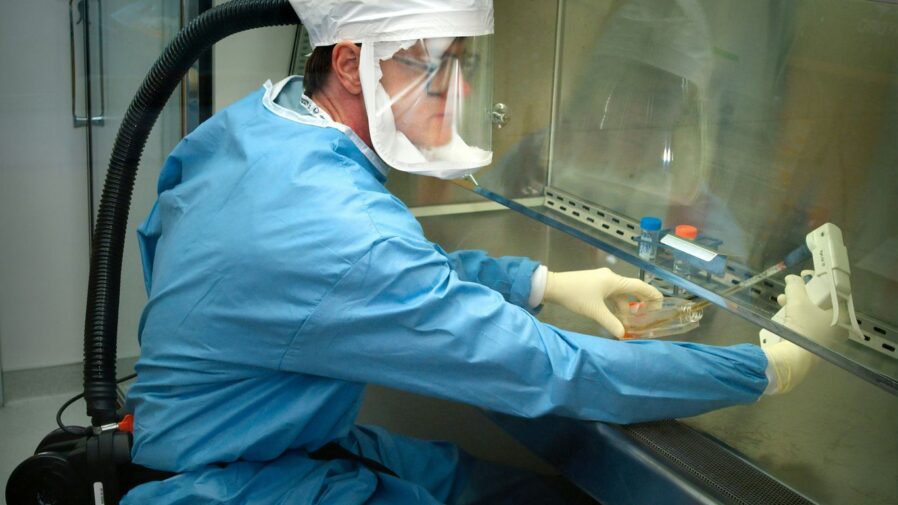
Cancer care is always changing, and at Quest Diagnostics, we’re working to keep up. We partner with doctors and researchers to make cancer treatment better. It’s a big job, but we’re here to help turn tough challenges into chances for new discoveries.
Comprehensive Solid Tumor Solutions
Figuring out the best treatment for solid tumors can be tricky. We have tools that help doctors match patients with standard treatments, clinical trials, or even newer therapies that aren’t widely used yet. Our goal is to make testing for solid tumors easier and more useful for everyone involved.
Unlocking Blood Cancer Insights
When it comes to blood cancers, getting the right information is key. We provide a full range of tests for blood and bone marrow issues, from the common ones to the more specialized. This includes molecular tests, some of which were developed right here at Quest Diagnostics. We also do cytogenetics, flow cytometry with special panels, and tests for things like paroxysmal nocturnal hemoglobinuria. Plus, we have reference menus for FISH, IHC, and special stains.
Understanding Hereditary Risks
Knowing if someone has a higher risk of cancer due to family history is important. We offer a complete set of tests for hereditary cancers. These tests help doctors understand the risks better, act on that information, and keep patients involved in their care. This is part of our work in areas like colorectal and prostate cancer screening too.
We believe that by providing detailed genetic information from tumor testing, we can help doctors make more informed decisions about a patient’s treatment plan. This includes looking at a wide range of genes, as well as markers like tumor mutation burden and microsatellite instability, which can guide the use of certain immunotherapies.
Here’s a look at some of the tests we use:
- Solid Tumor Expanded Panel: A 523-gene test that gives a broad genomic picture of a tumor. It can be helpful for patients with few treatment options or those considering clinical trials. It also checks for TMB and MSI, which are important for immunotherapy decisions.
- Haystack MRD™: A test for minimal residual disease in solid tumors.
- Heme MRD: Tests for minimal residual disease in blood cancers, using both molecular and flow cytometry methods.
Our science team is always looking at new ways to analyze tumors, using the latest technology for tissue, immune, and liquid biopsies. We also have a large network of labs around the world, focused on automation and making sure samples get where they need to go without issues. And if you need help with regulations, our experienced advisors can guide you through the process with health agencies in different countries.
Pioneering Precision Oncology
In-Depth Oncology Expertise
Working with our specialized oncology teams means you’re collaborating with people who really know their stuff, both in developing therapies and in the diagnostics that go with them. Our main goal is to make sure patients can actually get the treatments you’re working so hard to create. We’re part of a bigger network at Quest Diagnostics, which gives us a lot of resources to draw from. It’s all about making sure the right tests are available when they’re needed.
Science and Technology in Oncology
Our science folks are right there at the front lines of how precision oncology is changing. They use the newest tech for looking closely at tissue samples, immune responses, and even blood samples, which we call liquid biopsies. This detailed look helps us figure out what’s going on at a molecular level.
Operational Excellence in Diagnostics
We’ve got a huge lab network all over the place, and it covers a lot of different testing areas. We’re always trying to automate things and make sure samples get where they need to go without any mix-ups. It’s about making the whole process run smoothly, from the moment a sample is collected to when the results come back.
Regulatory Insight for Oncology
When you’re dealing with new tests or treatments, the rules and regulations can get pretty complicated. We have people who are really good at understanding these rules and talking to the agencies that make them. They can help figure out the best way to get your diagnostic tests approved and available in different countries. It’s a big help when you’re trying to get a new cancer therapy to patients.
Molecular Testing for Enhanced Cancer Care
Subspecialized Pathology Solutions
Getting the right diagnosis is the first step, and that’s where our pathology team really shines. We have over 400 pathologists who focus on specific areas, so they know their stuff inside and out. This means we can handle everything from routine bone marrow checks to really complex cases. We even use digital pathology to get a clearer look. It’s all about making sure the initial diagnosis is as accurate as possible, setting the stage for everything that follows.
Molecular Testing for Prognosis
Once a diagnosis is made, knowing what to expect is the next big question. Molecular tests can give us a better idea of how a cancer might behave. For example, tests like Prosigna® for breast cancer or our LeukoVantage® panels for myeloid neoplasms help doctors understand the likely path of the disease. This information isn’t about predicting the future exactly, but it helps in planning the best course of action. It’s like getting a more detailed map for the journey ahead.
Treatment Selection Through Genomic Profiling
This is where things get really interesting. Genomic profiling looks at the specific genetic makeup of a tumor, which can be a game-changer for picking the right treatment. Our solid tumor expanded panel, for instance, checks over 500 genes. It can identify specific changes in the tumor that might respond to certain targeted therapies. It also looks at things like Tumor Mutation Burden (TMB) and Microsatellite Instability (MSI), which can tell us if a patient might benefit from immunotherapy. This kind of detailed information helps doctors move away from a one-size-fits-all approach and towards treatments tailored just for that patient’s cancer.
The goal is to match the right drug to the right patient at the right time. By understanding the tumor’s unique genetic fingerprint, we can make more informed decisions about therapy, potentially leading to better outcomes and fewer side effects from treatments that wouldn’t have worked anyway.
Here’s a look at what our genomic profiling can cover:
- Gene Mutations: Identifying specific changes in DNA.
- Gene Fusions: Detecting when genes have combined abnormally.
- Copy Number Variants: Checking for extra or missing copies of genes.
- Biomarkers: Assessing markers like TMB and MSI for immunotherapy eligibility.
This detailed analysis helps guide treatment choices, especially for patients with limited options or those considering clinical trials. It’s about using the most up-to-date science to make cancer care more personal and effective.
Advanced Diagnostics Across the Cancer Continuum
High-Precision Minimal Residual Disease Testing
Tracking cancer after treatment is a big deal. It helps us see if the treatment worked and if the cancer is coming back. We have tests that are really good at finding even tiny amounts of cancer cells left behind. These are called minimal residual disease (MRD) tests. For solid tumors, we have something called Haystack MRD™. And for blood cancers, we use molecular and flow cytometry methods to check for MRD. It’s all about being super precise.
Solid Tumor Expanded Panel Analysis
When it comes to solid tumors, we look at a lot of different genetic markers. Our expanded panels can analyze over 500 genes, looking at both DNA and RNA. This gives us a really detailed picture of the tumor’s makeup. We can spot over 50 different gene fusions and copy number variations. This kind of deep dive helps doctors figure out the best treatment plan for each person.
Hematologic Cancer Diagnostics
For blood cancers, we have specialized tests too. This includes things like rapid mutation panels for Acute Myeloid Leukemia (AML) and broader panels for myeloid neoplasms. We also use next-generation sequencing (NGS) specifically for hematologic cancers. Our subspecialized pathology teams are key here, providing comprehensive workups and integrated reports. It’s about getting clear answers for complex blood disorders.
Understanding the specific genetic changes in a patient’s cancer is becoming more important. These tests help doctors make more informed decisions about treatment, which can lead to better outcomes for patients. It’s a step towards more personalized care for everyone.
Targeted Therapy and Clinical Development
Targeted Therapy Profiling
Figuring out the right treatment for cancer often means looking at the specific changes in a tumor. We help with that by providing detailed molecular panels. These panels can spot many different mutations that might be targeted by specific drugs. This information is key for creating a treatment plan that’s just right for each patient. It’s about matching the right drug to the right person based on their cancer’s genetic makeup. Our goal is to make precision oncology more accessible and effective.
Integrated Drug and Diagnostic Capabilities
When a new cancer drug is developed, having the right diagnostic test ready at the same time is super important. It means patients can start treatment faster without unnecessary delays. We work to make sure the diagnostic side of things keeps pace with drug development. This helps avoid confusion and speeds up getting patients the care they need. We support this by making sure tests are available when a drug gets approved, often referred to as ‘Ready Day 1’ programs. This involves a lot of coordination, from lab readiness to educating healthcare providers about the new test and therapy. It’s a big part of making sure new treatments can reach patients quickly and smoothly.
Clinical Development Insights
Developing new cancer treatments is a complex process. We assist by providing insights that can help shape oncology strategies. This includes analyzing patient groups based on their diagnosis, specific biomarkers, or how they might respond to certain treatments. By understanding these details, we can help make clinical trials more efficient and targeted. This approach can also improve how new therapies are introduced to the market, making sure they reach the people who can benefit most. It’s about using data and scientific knowledge to improve the journey from research to patient care. We also help with things like companion diagnostics, which are tests used alongside a specific drug to see if it will work for a patient. This ensures that the diagnostic and the drug work together perfectly from the start, which is good for both patient access and the success of the treatment itself. We also provide support services to make this whole process easier, from collecting samples to getting the test results back quickly. This kind of support is vital for the successful development and rollout of new cancer therapies, helping to improve patient outcomes across the board. For example, understanding how certain biomarkers influence treatment can be seen in resources like our white paper on navigating biomarker-driven therapies in oncology navigating biomarker-driven therapies.
Here’s a look at some key areas we focus on in clinical development:
- Companion Diagnostic Development: Making sure tests and drugs are developed in sync.
- Commercialization Support: Helping new therapies and their companion tests become available on ‘Day 1’ of approval.
- Broad Support Services: Offering everything from sample collection to expert interpretation to streamline the process.
Pathology Expertise and Comprehensive Testing
Pathology Resource Committees
We have teams of pathologists who focus on over 400 different areas of cancer. This means we have specialists covering everything from blood cancers to solid tumors and molecular testing. These groups help make sure our testing is up-to-date and relevant for what doctors and patients need right now. They can suggest new tests or changes to existing ones to keep our oncology services current.
Technical and Professional Component Solutions
Need to boost your lab’s capabilities? We can help. Our labs are CLIA-certified, and we provide project managers to oversee everything. This means you can expand your testing services without having to build everything from scratch. We handle the technical side, so your team can focus on patient care and interpreting results.
Delivering Cancer Insights from Screening to Survivorship
Getting the right information at the right time is key in cancer care. We provide tests that help at every stage, from finding cancer early to managing it after treatment. Our tests give doctors the details they need to make informed decisions for each patient.
Here’s a look at how our tests support patients through their cancer journey:
- Screening: Identifying potential cancer risks early.
- Diagnosis: Confirming the presence and type of cancer.
- Prognosis: Understanding how a cancer might progress.
- Treatment Selection: Guiding the choice of the best therapies.
- Monitoring: Tracking the cancer’s response to treatment and looking for recurrence.
Our goal is to provide clear, actionable information that helps doctors manage cancer effectively, from the very first signs all the way through a patient’s recovery and beyond. We aim to make complex information understandable and useful for better patient outcomes.
Moving Forward with Precision Oncology
Quest Diagnostics is really pushing the boundaries in cancer testing. They’ve got a lot of different tests, from looking at solid tumors to blood cancers and even hereditary risks. It seems like they’re trying to make things clearer for doctors and patients, helping pick the right treatments and keep an eye on how things are going after treatment. It’s a big job, but it feels like they’re putting a lot of effort into making cancer care more personalized and effective for everyone involved. They’re definitely a player to watch as cancer treatment continues to evolve.

